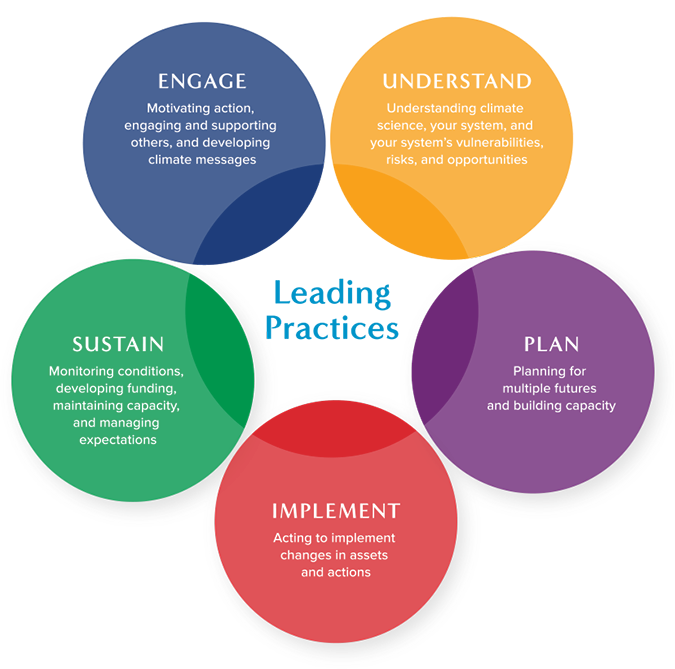Leading practices in climate adaptation
While water utilities are highly adept at understanding and mitigating uncertainty, climate change exacerbates current challenges and adds new risks to already complex utility practices. Climate adaptation requires working across business functions and organizational silos, necessitating more integration and new tools. It benefits from collaboration across sectors, including businesses and suppliers, and among the utility, the city, and the region. Developing new approaches is not easy—nor is the work straightforward—yet there is an incredible power in learning from and with each other.
For more than 10 years, the Water Utility Climate Alliance (WUCA) has been at the forefront of strengthening the field of climate adaptation. WUCA members have uncovered ways to build adaptive capacity and incorporate new climate science into water management, planning, investments, and actions. To share what worked, WUCA has compiled climate adaptation practices that have been tested, leveraging WUCA members' experiences to build a shared knowledge base and illustrate not-always clear directions forward. The goal is to make approaches for successful climate change adaptation easier to discover, understand, and navigate, and to help other utilities avoid having to recreate the wheel or invest in unnecessary efforts, thus saving time and money.
This collection of leading practices in climate adaptation covers a suite of climate adaptation actions and is intended to broadly promote collaborative learning. Each practice in the collection is explained and supported by concrete examples. These practices are drawn from WUCA work products and WUCA members' experiences, and, when possible, connected to relevant resources and related efforts. Most of these practices are appropriate for water utilities of any size, as well as other sectors interested in climate adaptation.
Download the full Leading Practices report(Opens PDF document)(Opens new window)
Download a short overview(Opens PDF document)(Opens new window) and learning-sharing worksheet(Opens PDF document)(Opens new window)
The Leading Practices Collection
The current practices and where they are placed within the five essential climate adaptation action areas are shared below.
Action areas and leading practices are not prioritized. Instead, the most useful practices depend on the individual organization's needs and priorities.
Valuable lessons
In compiling these leading practices, WUCA learned several lessons that may help support climate adaptation practices within other organizations:
- The process is often more important than the resulting plan. In this and other WUCA projects (e.g., engineering case studies, WUCA's Building Resilience to a Changing Climate technical training), the opportunity to encourage conversations (two-way, both listening and sharing) about climate adaptation within and across utilities was valuable. WUCA hopes this report's living-document design will continue to facilitate these types of conversations within and across water utilities and in other sectors as well.
- Climate adaptation champions are integral to the success of most leading practices.
- Utilities are seeking ways to improve their ability to mainstream climate change information into existing business functions.
- Mainstreaming simultaneously allows for the identification of practical, relevant, and achievable adaptation solutions while also fostering internal champions.
- The science will never be perfect, so learning about strategies for making decisions in the face of deep uncertainty is key to taking climate adaptation action.
- The perfect can be the enemy of the good. Developing perfect climate adaptation actions may slow progress and prevent necessary learning. It is important to try different things to learn and adapt. The climate change adaptation landscape is also rapidly changing, so what gets developed may need to be revised sooner than anticipated.
- Adaptation is an iterative process. Essential climate adaptation actions and leading practices need to be re-visited over time as they continue to inform and support each other.
